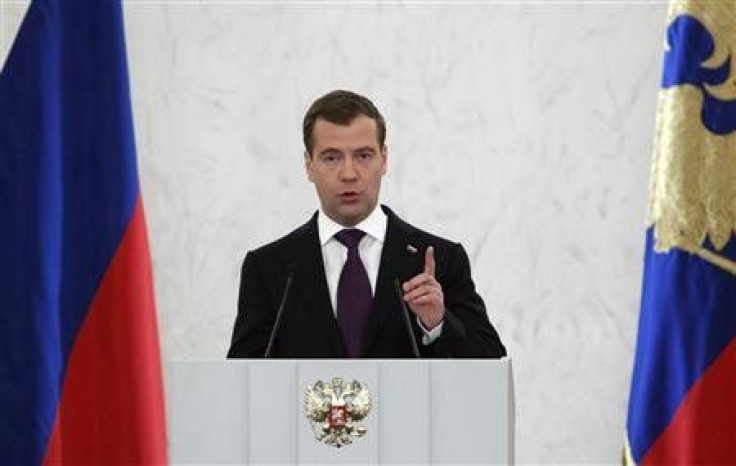Medvedev blames security lapse for Moscow blast

President Dmitry Medvedev placed the blame on Tuesday on a lapse in security for allowing a suspected suicide bomber to kill at least 35 people and wound scores at Russia's busiest airport.
There was no immediate claim of responsibility for Monday's attack at Moscow's Domodedovo airport, but the action bore hallmarks of militants fighting for an Islamist state in the North Caucasus region on Russia's southern frontier.
It's obviously a terrorist act that was planned well in advance in order to cause the deaths of as many people as possible, said President Dmitry Medvedev on Tuesday.
What happened shows that there were clear security violations, he said. The attacker evaded security to carry the explosives into the airport's arrival hall.
North Caucasus rebels have threatened attacks against cities and economic targets in the run-up to parliamentary elections this year and 2012 presidential polls. The choice of Domodedovo, resulting in the deaths of several foreigners, suggested the attackers sought to raise uncertainty beyond Russia's borders.
Russia is due to host the 2014 Winter Olympics in Sochi, on the edge of the Caucasus, which some rebels consider part of the territory they aim to include in an Islamic state.
Medvedev, due to open the World Economic Forum on Wednesday, delayed his departure to the Swiss city of Davos and was due to hold a meeting with his security services on Tuesday. On Monday he vowed to track down and punish those behind the blast.
Russian media reports gave conflicting information about the identity of the suspected bomber, or whether there might have been more than one attacker.
Prime Minister Vladimir Putin, the more powerful in Russia's 'tandem' political leadership, built his early reputation as a strong leader by launching a war in late 1999 to crush a rebel government in the Northern Caucasus's Chechnya region. That campaign achieved its immediate aim, but since then, insurgency has spread to neighbouring Ingushetia and Dagestan.
It has also assumed a more ruthless edge, spawning hardline factions difficult to monitor. Putin and Medvedev have said they would crush the rebel movements, but their control in the region has sometimes looked tenuous.
These would likely (but not necessarily) be Islamists from the Northern Caucasus. If so, yet another example of the proposition that success in Chechnya has generated a more diffuse and dangerous threat, said Neil MacFarlane, Professor of International Relations, St. Anne's College, Oxford.
The consequences? More abuse of people of Caucasian origin in Moscow and elsewhere in Russia...more intense military/police response in the region will make the problem more severe rather than less, because of the methods that are likely to be employed, and the obligation to revenge.
NATIONALIST VIOLENCE
The spread of violence from the North Caucasus, where it is fed by a cocktail of corruption, poverty and clan rivalries as well as religious radicalism, fans Russian nationalist militancy in the heartland.
Tensions between ethnic Russians and the 20 million Muslims who make up one seventh of Russia's population flared dramatically last month in a string of clashes, which involved thousands of Russian nationalists who attacked passersby of non-Slavic appearance, many of them from the North Caucasus.
The incidents caused alarm in the Kremlin.
Analysts said such attacks, if sustained, could raise doubts over foreign involvement in the Russian economy, although there were no signs of any serious reaction in Russian markets to Monday's attack.
The prosecutor's office said the attack, the largest since twin suicide bombings on the Moscow metro rocked the Russian heartland in March, was most likely carried out by a suicide bomber.
Moscow suffered its worst attack in six years in March last year, when two female suicide bombers from Dagestan set off explosives in the metro, killing 40 people.
The worst incident involving North Caucasus rebels took place in 2004 when militants seized control of a school in the town of Beslan. When Russian troops stormed the building in an attempt to end a siege, 331 hostages, half of them children, were killed.
© Copyright Thomson Reuters 2024. All rights reserved.











